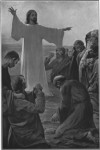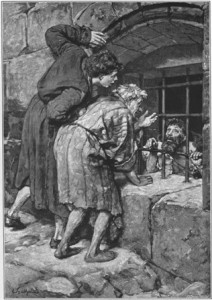From Matthew 11-12
God works in mysterious ways. So does Jesus. When Jesus was preaching, healing and associating with sinners people were asking if he was the one to come or not. They did not expect the coming Christ to behave as he did. The kingdom was being ushered in in unusual ways. Jesus had another way in mind. We need to focus on him and learn his way, not to jump to conclusions about how God should work.
This post is part of my bible in a year series.
Passage and Comments
The gospel names the twelve disciples (Mt 10.1-4). Then Jesus teaches and prepares them to go on mission trips (Mt 10.5-42). This is where our passage picks up.
11 When Jesus had finished instructing his twelve disciples, he went on from there to teach and preach in their cities. (Mt 11:1)
When he has finished teaching his disciples, Jesus is approached by some disciples of another (Mt 11.2f). John the baptist.
2 Now when John heard in prison about the deeds of the Christ, he sent word by his disciples 3 and said to him, “Are you the one who is to come, or shall we look for another?” (Mt 11:2)
It was common belief the Christ would come and redeem Israel.
John is not sure who Jesus is. But he hears about the ‘deeds of the Christ’. He knows what Jesus has done. His miracles and healings. His teaching.
John is in prison because he kept condemning Herods behaviour (Mt 4.12; Lk 3.18-19). Its clear they were waiting for someone significant. ‘The one who is to come’.
Do you think Jesus is the Christ who was promised to come?
4 And Jesus answered them, “Go and tell John what you hear and see:
5 the blind receive their sight and the lame walk, lepers are cleansed and the deaf hear, and the dead are raised up, and the poor have good news preached to them. 6 And blessed is the one who is not offended by me.” (Mt 11:4-6)
Jesus throws it back at him. He essentially tells him what he already knows. Is there a subtle rebuke in his answer do you think? Should John have known from Jesus’ deeds that he was the Christ.
After giving a list of what he has been doing Jesus says those who are not offended by him are blessed. Perhaps another subtle message for John. This time a warning.
Are you offended by Jesus? What do you say about him?
7 As they went away, Jesus began to speak to the crowds concerning John:
“What did you go out into the wilderness to see? A reed shaken by the wind? 8 What then did you go out to see? A man dressed in soft clothing? Behold, those who wear soft clothing are in kings’ houses. 9 What then did you go out to see? A prophet? Yes, I tell you, and more than a prophet. 10 This is he of whom it is written,
“ ‘Behold, I send my messenger before your face, who will prepare your way before you.’ (Mt 11:7–10)
Jesus turns from John’s disciples to the crowds around him. He basically asks them what did they expect of John and perhaps himself?
In what way do you expect God’s messengers to come? Some sort of ticket tape parade? Bright signs?
Jesus implies God’s messengers are not kings. They don’t wear fancy clothing. They are not rich.
He asks them another question along the same theme. So what did they expect? A prophet it seems. A prophet anticipated to come in the scriptures. Malachi 3.1 predicts the coming of John, who himself would prepare them for what is to come.
We often ask God to prepare the hearts of non-Christians so they may believe in Jesus.
11 Truly, I say to you, among those born of women there has arisen no one greater than John the Baptist. Yet the one who is least in the kingdom of heaven is greater than he. (Mt 11:11)
John is great in this world. In God’s kingdom, the least is greater. I can’t see how flattering this is for John. Remember John hasn’t quite got it that Jesus is the Christ.
“John was indeed the greatest among the preparers, but even the most insignificant person who was accepting God’s kingdom and living by it—in other words, who was hearing Jesus and following him—was ‘greater’, simply because they were living in the time of fulfilment.” (Wright, T. (2004). Matthew for Everyone, Part 1: Chapters 1-15 (p. 129). London: Society for Promoting Christian Knowledge.)
12 From the days of John the Baptist until now the kingdom of heaven has suffered violence, and the violent take it by force. 13 For all the Prophets and the Law prophesied until John,
14 and if you are willing to accept it, he is Elijah who is to come. 15 He who has ears to hear, let him hear. (Mt 11:12-15)
Jesus use of ‘violence’ has negative overtones. Presumably up until now those who were about the kingdom of heaven were opposed violently. Prophets and the righteous were killed by the people.
On the other hand some tried to bring about God’s kingdom by force. I’m thinking of the Zealots. Jesus is not praising these people. He has another kingdom in mind entirely. He also has another way of ushering it in as well.
The Prophets and the Law came before the gospel. These are narratives of Jewish history. Not just oracles and laws. They anticipated the coming of God’s kingdom and the Christ all the way.
Jesus says John the Baptist is the Elijah who is to come. In the Old Testament Elijah is followed by Elisha who has a greater ministry. You need to think a bit to realise Jesus’ meaning.
If John the baptist is likened to Elijah, what does that say about Jesus?
16 “But to what shall I compare this generation? It is like children sitting in the marketplaces and calling to their playmates,
17 “ ‘We played the flute for you, and you did not dance; we sang a dirge, and you did not mourn.’
18 For John came neither eating nor drinking, and they say, ‘He has a demon.’ 19 The Son of Man came eating and drinking, and they say, ‘Look at him! A glutton and a drunkard, a friend of tax collectors and sinners!’ Yet wisdom is justified by her deeds.” (Mt 11:16–19)
John the Baptist and Jesus are held up as the new Elijah and Elisha. But there is a twist to this new story. The people they minister to do not ‘dance to the music played for them’. They do not mourn when future judgment and punishment is proclaimed. Rather they question him, second guess his actions and criticise him for his behaviour.
Overall, neither John the Baptist, Jesus, or their messages are received.
‘Yet wisdom is justified by her deeds’, or some texts say, ‘wisdom is justified by her children’ which I think makes the statement clearer. Jesus is saying, the proof is in the pudding. The wisdom of his actions will be shown in the long run, despite their rejection of him.
About Jesus
“Throughout this chapter Jesus is dealing with the fact that what he’s doing is not what people were expecting him to. He knows it, is facing it, and believes that this is the way to go, the way to bring in God’s kingdom even though this isn’t what others had imagined. The trouble is, though, that in terms of the illustration the other actors aren’t necessarily getting the message, and the audience is getting puzzled.” (Wright, T. (2004). Matthew for Everyone, Part 1: Chapters 1-15 (p. 125). London: Society for Promoting Christian Knowledge.)
Are you ready for the way God is going to work in your life?
Copyright © Joshua Washington and thescripturesays, 2015. All Rights Reserved.



